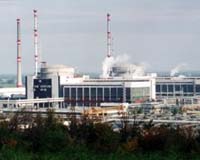 |
Strasbourg, France (AFP) April 25, 2011 Around 700 anti-nuclear protesters staged a "die in" on a bridge on the Franco-German border Monday, on the eve of the 25th anniversary of Chernobyl and after Japan's Fukushima nuclear accident. The Easter Monday demo was one of several to be staged on bridges over the Rhine around Strasbourg to mark the world's worst nuclear accident at Chernobyl in the Ukraine on April 26, 1986 as well as the Fukushima crisis. The main protest at the midway point on the Pont de l'Europe joining Strasbourg in eastern France and Kehl in Germany was to show that "radioactivity knows no borders," said organiser Remi Verdet. "We're here to remind people that zero risk does not exist," he said. Protesters carrying Japanese and Ukrainian flags dropped to the tarmac as sirens wailed for the "die in", before they threw flowers into the Rhine in memory of those killed by nuclear accidents. A powerful March 11 earthquake followed by a giant tsunami cut the electricity to Fukushima's nuclear reactors, shutting down the cooling system and leading to the world's worst nuclear crisis since Chernobyl. Protesters are also demanding the closure of France's oldest nuclear power station at Fessenheim. In service since 1977, the Fessenheim plant lies in a densely-populated part of France, less than two kilometres from Germany and around 40 kilometres (25 miles) from Switzerland. French television presenter and green activist Nicolas Hulot, who announced earlier this month that he hopes to run as an environmentalist candidate in the 2012 presidential election, is due to attend the Pont de l'Europe protest. "Fukushima is what finally convinced me that nuclear power can no longer be the answer to the planet's energy future," Hulot told journalists ahead of the protest. "I was one of those who had a certain trust in the arguments of pro-nuclear engineers. Their arguments are today losing their edge in the face of the facts." Protesters in southwestern France staged another protest in the form of a mass picnic in front of the Blayais nuclear reactor, north of Bordeaux, also in memory of Chernobyl. "We can't stop tsunamis but we can stop nuclear power stations," read one banner. Organisers said around 1,000 people took part, while police put the number at 300. "June 12 will be the 30th anniversary of reactor number one entering service, its originally planned lifetime by (electricity group) EDF," said protest organiser Stephane Lhomme. "This and all plants that are over 30 years old must be closed," he said. France's Nuclear Safety Authority (ASN) has said that French nuclear security has not yet taken into account the kind of accumulation of natural catastrophes that led to Japan's disaster. The French government has told the ASN to carry out a security audit at the 58 active atomic reactors in France, which is proportionally the world's largest user of nuclear power. The results of the audit are expected by the end of the year. French authorities at the time of the Chernobyl disaster were criticised for a lack of transparency, with many interpreting officials' declarations as saying that radioactive pollution had not crossed the border from Germany into France. burs-cjo/boc
Share This Article With Planet Earth
Related Links Nuclear Power News - Nuclear Science, Nuclear Technology Powering The World in the 21st Century at Energy-Daily.com
 Bulgarian nuclear plant at Kozloduy faced EU stress test
Bulgarian nuclear plant at Kozloduy faced EU stress testKozloduy, Bulgaria (AFP) April 24, 2011 Bulgaria's sole nuclear plant at Kozloduy, spotlighted in the 1990s over safety issues, is looking forward to European stress tests, following Japan's nuclear disaster. "Our plant is the most controlled one in Europe: 25 missions over the last 12 years, including from the (UN nuclear watchdog) IAEA and WANO (World Associaton of Nuclear Operators)," Kozloduy's executive director Kostadin Dimi ... read more |
|
| The content herein, unless otherwise known to be public domain, are Copyright 1995-2010 - SpaceDaily. AFP and UPI Wire Stories are copyright Agence France-Presse and United Press International. ESA Portal Reports are copyright European Space Agency. All NASA sourced material is public domain. Additional copyrights may apply in whole or part to other bona fide parties. Advertising does not imply endorsement,agreement or approval of any opinions, statements or information provided by SpaceDaily on any Web page published or hosted by SpaceDaily. Privacy Statement |